The Young Master (1980)
Directed by: Jackie Chan
Written by: Jackie Chan, King Sang Tang, Lu Tung, Tin-Chi Lau
Starring: Jackie Chan, Lily Li, Pai Wei, Yuen Biao
AKA SHI DI CHU MA
AVAILABLE ON BLU-RAY AND DVD
RUNNING TIME: 106 mins [Hong Kong version], 105 mins [Taiwanese version], 99 mins [Japanese version], 90 mins [‘International’ version]
REVIEWED BY: Dr Lenera
Dragon Lung and Tiger live in the Wai-Yee martial arts school run by Master Tien, who took them in as child orphans when they were living rough on the street. Tiger fakes an injury and secretly lion dances for the rival Ching Fung school during a competition, whereupon Dragon deliberately loses the dance so as not to offend his Senior Brother. After Tiger’s treachery is revealed, Tien banishes him from the school. Dragon vows to track Tiger down and get him to make amends, but en route is mistaken for a criminal known as ‘The White Fang’ by local police chief Sang Kung. Meanwhile, Tiger aids some members of the Ching Fung school by freeing a dangerous criminal known as Kam….
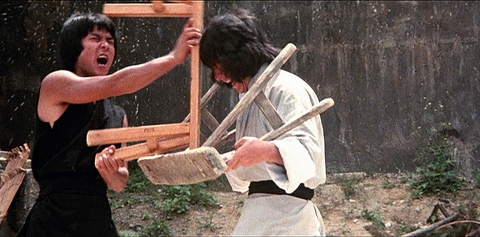
I’d reviewed The Young Master some years ago, but seeing as it’s the latest Jackie Chan film released by 88 Films, I thought I’d expand on the older review and rework it a bit. Much like their previous release The Fearless Hyena, it doesn’t seem to be mentioned as often as many of his others, yet it’s a very important one in his career, and not just because it was his first for Golden Harvest Studios. The Fearless Hyena saw Chan write and direct what was basically a rehash of Snake In The Eagle’s Shadow and Drunken Master; there was more freedom and smoothness in the choreography, but it still had one hand in the old school martial arts movie, still felt a tad constrained. But The Young Master has him depart much more from tradition with a film that, while still set in the past, removed or toned down many of the cliches such as the training in a new form of fighting to defeat the main bad guy, and moved away much more from classical martial arts. It doesn’t work as well as a narrative as the afore-mentioned films; in fact the story almost seems to fall apart in the second half, but its freewheeling nature has its own appeal, it looks more lavish than the ones before with the significantly higher budget being up there on the screen, and in terms of choreography it soars ahead. Filming commencing without a finished script [admittedly this was nothing new for Hong Kong cinema], and over an hour’s worth of cuts really do show in the finished product, but it has as much infectious energy and originality as the very best of Chan’s movies, meaning that I’m tempted to whip off my critic’s hat for this one and let its plot issues go. After all, I’ve watched it more often than any of Chan’s ’70s films. And it includes Chan’s longest ever brawl, running a whopping seventeen minutes – and it’s great too if rather unbelievable considering the punishment Chan’s character takes.
As I’ve detailed before, Snake In The Eagle’s Shadow and Drunken Master finally brought Chan box office success, but his old producer Lo Wei was determined to hang onto him. He allowed him to make The Fearless Hyena with more control, but Golden Harvest offered Chan a much nicer home, and he began work on The Young Master there. But Wei got the Triads involved and the set was home to two fires and an executive finding a dog’s head in his car. Chan had to take a ride to Wei’s office in a limousine which had the number plate blacked out. Wei reminded him of their contract but significantly increased the amount of money he’d have to receive should Chan want to get out of it. The One-Armed Boxer Jimmy Wang Yu sorted things out but Chan owed him two films. Chan’s perfectionism and money spending was much criticised during shooting, it taking him at least three hundred [the number varies depending on your source] takes to get right a bit where he catches a fan he has kicked into the air. He was shooting Battlecreek Brawl in the US while Golden Harvest did their own cut, but they removed so much that Chan did his own edit at night, meaning that he got by on just two hour’s sleep for several weeks. But this was deemed far too long, so Chan had to further re-edit. For some reason, both the shorter [by a minute] Taiwanese version and the Hong Kong version contain exclusive footage, the former mostly having slightly longer fights and the latter containing more humour. The Japanese version had a different soundtrack and shortened every fight scene except the last, though it restored four short plot-orientated scenes; the International Version was almost the same though it cut down the final fight. It was the biggest Asian box office success for Chan yet and did well on video in the west too.
We open with preparations for a lion dance, our first introduction to Dragon cutting to him doing press-ups while hanging off a small tower – as you do. But not many stars of the time would have also had him fall off and injure himself because somebody left a bucket where he fell. The competition begins and I’m going to admit that I usually begin to lose a bit of patience here as lion dancing isn’t really my thing, but this time around I was able to concentrate on the many amazing feats that are performed, such as the person at the back of Lung’s lion kicking a cabbage to Lung at the front, who catches it. The contestants have to mimic devouring plants and jump up ever higher plant pots to a beam where they engage in what’s virtually a fight. Lung loses so his brother Tiger can win, and I get this loyalty thing where you have to obey your ‘Senior Brother’, but, when he’s such an unpleasant person, surely this shouldn’t extend to sneaking prostitutes in to him, and not giving him away when Master Tien catches her with Lung? Master Tien isn’t the nicest either; we can understand him beating Tiger, but does he really need to take out his anger on some of the others, even threatening a young boy? These early scenes tend to be full of exaggerated angst which almost seems laughable to us today, though Chan appears to be crying for real. Tiger is treacherous, he’s probably working for the opposing school just for money, but they don’t seem to be in a rush to accept him. In fact the real villains are a few other members of the Ching Fung and the evil and powerful Master Kam. We first see Kam tied down, but we’re assured that he was only captured because he was drunk, “otherwise, not even ten constables could get the better of him”. Hapkido master and super kicker Whang Inn-Sik’s sudden burst into lethal action is a breathtaking highlight, though he could have had a scene or too with Chan before their climactic battle.
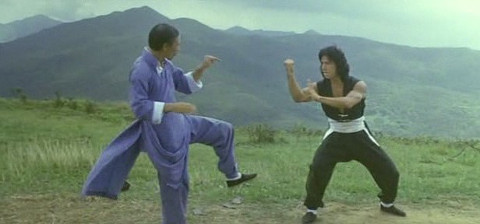
Of course it’s best not to swell on things like plot and character motivation, things that are actually slightly clearer in the non-Hong Kong cuts of the film where the relationship between Dragon and Tiger gets a couple more beats rather than almost disappearing in the second half, even if it’s still given short shrift seeing as it’s supposed to be the emotional centre. And we never see Tien again even though he seemed to be a major character. But I really shouldn’t be complaining too much about this, especially when we could probably even put glaring continuity errors such as handcuffs which are on but then miraculously off the next scene down to the editing. For a start the laughs nearly all work. The middle portion is taken up with a really funny lengthy sequence when Dragon, who supposedly resembles The White Fang even though he actually doesn’t, sets out to find his brother and runs into three members of the same family without knowing said fact; the father being the police chief, the son being somebody who always carries a training bench with him and is played by Yuen Biao so we get some magic including a duel with benches between the two while the subtitles have Dragon say, “are you trying to bone me”?, and the daughter welcoming the unknowing Dragon into her father’s house before besting him with her ‘skirt kung fu’, where all the leg movement are concealed by a huge skirt – though not before he gets a look up said skirt! Soon after that he climbs up two walls with one leg and arm on each side – only to find that Biao’s character is waiting for him!
Chan’s first fight has him show off with the fan against a clumsy opponent; it’s the archetypal scene where he defeats his adversary with what looks like little effort even when we know it took ages to stage. Not long after that he engages in a comic sword fight that has him dodge swords with milimetres to spare. Chan doesn’t seem that challenged here either, so it’s a nice difference when he finds Baio’s character more of a match and is beaten by his sister! There really aren’t many fights, but then the last two take up most of the final quarter. First, Dragon duels with two bad guys in an audience-filled street which even involves a variation on bull fighting! Then he comes up against Kam. Throughout the film, the choreography has been very playful and inventive, but here we are treated to more of a display of brutality and endurance as Whang beats the crap of Chan again….again….and again. Like Rocky and Godzilla, Chan keeps on getting up, but he’s clearly out of his league. Rather than suddenly remembering a new skill he’s learned, he just goes berserk as, numb from pain, he runs at Whang like a lunatic and in addition to punching and kicking madly grabs, pinches and headbutts him while the Ching Fung master is now on his side so he can deliver useful advice like, “let him keep punching you and you’ll get used to it”. Never has Chan been so out of control and it’s great, though in a sobering realistic touch, Lung’s bones are all broken at the end and he’s covered with bandages! Chan made sure he was covered with dust so that when he’s hit, you can tell that it’s often for real, even if it’s often achieved by cables moving him so he absorbed the kick or punch but not all of its force.
Chan is – well – Chan. He’s already basically the character who he would play in many of his other films; playful but loyal, skillful in martial arts but liable to run away or lose a fight as win one etc. One can easily criticise Chan for playing basically the same person over and over again but it was his screen persona that helped him become such a big star for so many years, so he knew what he was doing. Plenty of familiar faces like Lee Hoi-Sang and Shih Kien are present and correct, while the Hi-Definition presentation reveals that Baio doubles virtually all of the main stars who fight in the film at some point. If you know your classical music you’ll probably chuckle at the music score, which mostly consists of excerpts from Gustav Holst’s ‘The Planets’ suite. It often does fit and even gives things more grandeur at times, though I remain disappointed that several uses of a bit from ‘Uranus the Magician’ fade out before we hear any more than a few notes of the rousing tune that follows which is my favourite passage of the whole suite. A suspense portion from John Barry’s Game Of Death score also appears a few times, plus a light hearted piece based on a folk tune. The International and Japanese versions have a soundtrack by Ryudo Uzaki and Akira Inoue who were big at the time in Japan. It’s a funkier, sometimes jazzier, score, though leaves some parts unscored which may have benefitted from musical backing. Overall The Young Master is a bit messy, but you’d expect nothing less considering its post production. It’s still a tremendous and rather overlooked showcase for one of the world’s greatest physical screen performers.
Rating: 










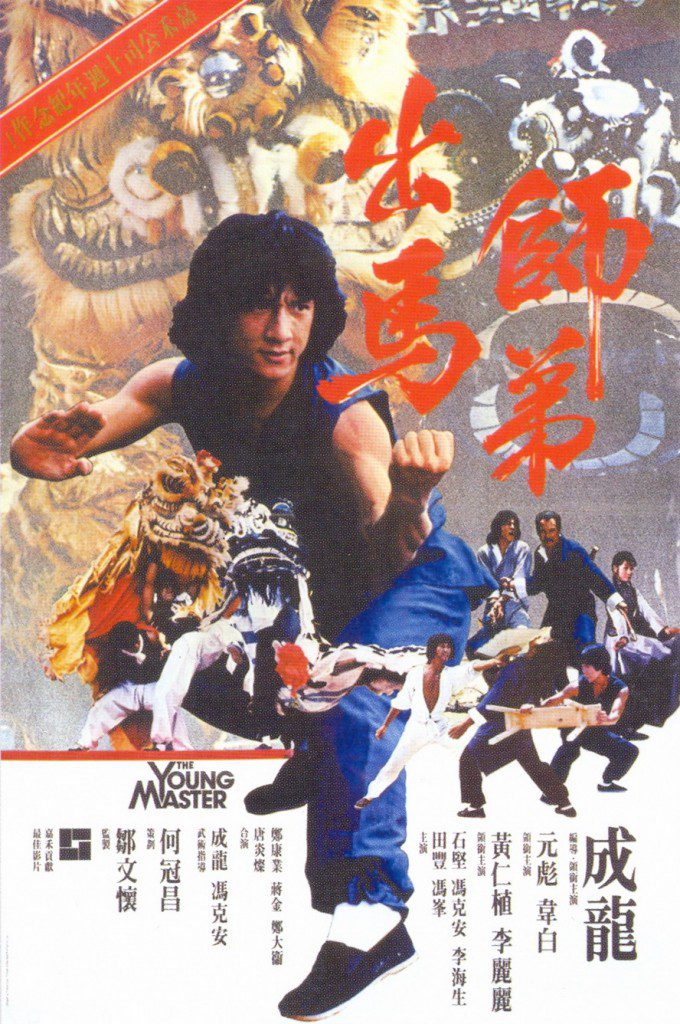

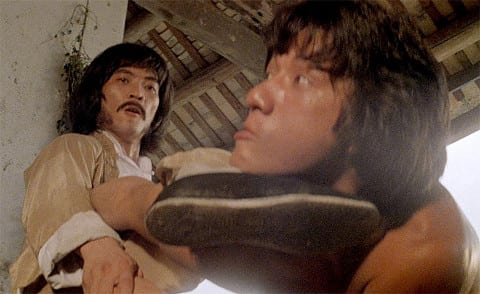
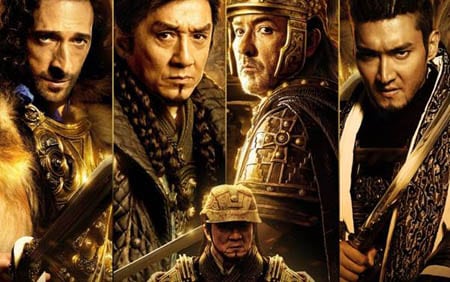

Be the first to comment